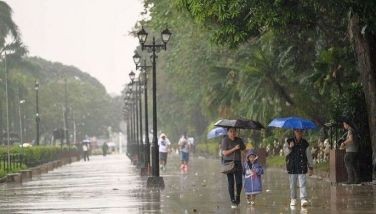Shame campaign launched vs epal bets
MANILA, Philippines – The Commission on Elections (Comelec) has launched a “shame campaign” against “epal candidates,” or those who grab attention by putting up unlawful campaign materials during the campaign period.
In a press briefing yesterday, Comelec Chairman Andres Bautista said the poll body would establish a “citizen reporting system” through which the public can send photos of prohibited campaign materials to the Comelec’s official website, Facebook page and Twitter account.
“We want the public to take photos of violators and then provide us with details. We will act on them,” he said.
According to Bautista, there are “three mortal sins” that candidates and parties should avoid committing.
One is posting campaign materials on trees, plants and other places outside of the common poster areas designated by Comelec.
Second is the excessive use of plastic and unrecyclable materials and irresponsible disposal of campaign materials.
Posting of materials in private properties without the consent of the owners is also illegal.
Incumbent officials were also reminded that putting their photographs and names on Department of Public Works and Highways’ project billboards is strictly prohibited.
Unlawful election materials constitute an election offense punishable with up to six years imprisonment, removal of right to vote and lifetime disqualification from holding public office.
Bautista warned candidates and political parties that illegal posting of campaign materials is sending voters a message “that they do not follow the law.”
Candidates running for national positions were asked to remove all forms of propaganda materials by weekend as the campaign period for them starts on Feb. 9.
According to Comelec Resolution No. 10049, such campaign materials shall be removed or caused to be removed by the candidate or party at least 72 hours before the start of the campaign period for national candidates or for local as the case may be. Otherwise, these will be “presumed to have committed the pertinent election offense during said campaign period.”
“The prohibited form of propaganda contemplated in this section include any names, images, logos, brands, insignias, color motif, initials and other forms of identifiable graphical representations placed by incumbent national and local officials on any public structures or places,” the resolution added.
The Comelec warned candidates that they would be held liable for election offense if their propaganda materials will not be removed.
The resolution also said that there shall be one common poster area per 5,000 registered voters or less. An additional poster area may be designated for every additional 5,000 voters or a fraction of it.
The size of each common poster area for political parties and party-list groups shall not be more than 12 by 16 feet, while independent bets can have a four by six feet poster area.
The common poster areas shall be in public places like plazas, markets and barangay centers.
With regard to billboards of products being endorsed by candidates, the Comelec will study how to deal with those put up in private properties.
Bautista signed a memorandum of agreement with Public Works and Highways Secretary Rogelio Singson and Metro Manila Development Authority chairman Emerson Carlos, who both vowed to help the poll body monitor and take down prohibited campaign materials.
‘Monitor spending for elections too’
Senate President Franklin Drilon also urged the Comelec to step up its regulation of election spending before and during the campaign period, which he said has gone out of control.
Drilon emphasized that the need to cover not only the expenses of candidates during the official campaign period, but also before it starts because many of the politicians spend a great deal pre-campaign.
For the past months, political advertisements of presidential, vice presidential and senatorial candidates have been coming out daily on television and radio when the campaign period is yet to officially start on Feb. 9.
Drilon noted that there is a grey area when it comes to regulating election spending before the campaign, which should be addressed by revisiting and updating the country’s election laws.
He cited the Supreme Court decision on Comelec vs Penera where it ruled that a person running for a public office would officially become a candidate at the start of the campaign period.
This, he said, is where the problem lies because politicians embark on heavy political ads and campaign promotion to gain popularity among voters before the start of campaign period, fully aware that their spending would eventually be restricted when the campaign proper kicks off.
DENR: Ensure garbage-free elections
Meanwhile, the Department of Environment and Natural Resources (DENR) has launched a drive to ensure garbage-free elections.
The Kalat Ko, Linis Ko campaign was launched in anticipation of the large volumes of garbage during the election period due to the proliferation of posters, flyers and other campaign paraphernalia, Environment Secretary Ramon Paje said.
The DENR, in partnership with the Department of the Interior and Local Government (DILG) and Comelec, will monitor national and local candidates if they properly dispose of their campaign materials and help clean the surroundings after the election.
Paje called on the public to also do their share in making the May elections garbage-free by reporting cases of election-related littering to authorities or bringing it directly to the attention of the candidates during public forums.
The DENR conducted the same campaign in the 2013 elections.
Officials of DENR, DILG and Comelec signed a manifesto of commitment to implement a memorandum circular jointly issued by the three agencies in 2013.
- Latest
- Trending































